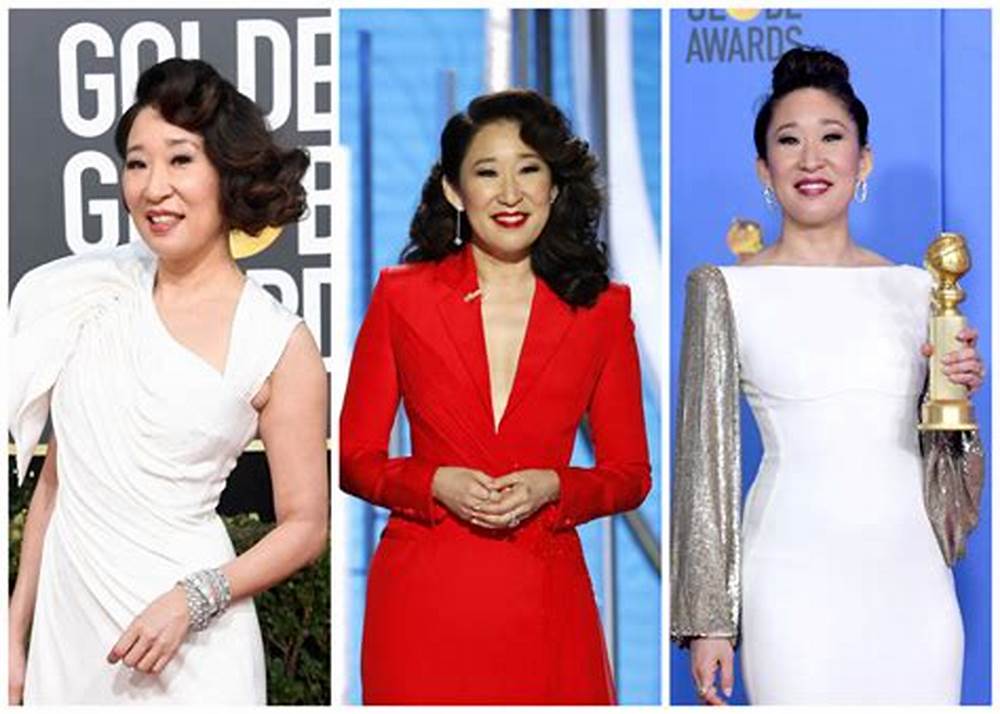By Guest Contributor: Jacqueline Wong
Sandra Oh recently made history three times at the 76th Golden Globes Awards as the first Asian American host, the first Asian American woman to win multiple Golden Globes, and the first Asian American woman in nearly 40 years to win for Best Actress in a TV Drama for her role in Killing Eve.
Yet it was not just her hosting duties or her receipt of a Best Actress award that made the night so special for Asian Americans. Rather, it was how Oh unabashedly celebrated her Asian-ness on live TV. Asian Americans have rarely been given the opportunity to have their faces or voices broadcasted live on such a large platform. By owning her Asian identity on stage, Oh took back control of the Asian American narrative.
What does that mean? For so long, Asian American portrayals or stories have been constructed by others. These depictions have reduced us to stereotypical caricatures: the socially inept foreigner, the overly-sexualized temptress, or the emasculated nerd, rather than real three-dimensional people.
That is if we are even seen at all. Asian Americans are still largely underrepresented in media entertainment, which negatively effects our population’s psyche. This phenomenon is called “symbolic annihilation,” or the idea that a group’s absence from the media signifies their social insignificance. The general audience not only begins to believe these messages, but Asian Americans begin to internalize them as well.
But at the Golden Globes, Oh recognized the impact she had standing in front of such a large crowd of Hollywood stars, and the wider American audience:
“I said yes to the fear of being on this stage tonight because I wanted to be here to look out into this audience and witness this moment of change. And I’m not fooling myself. Next year could be different. It probably will be. But right now, this moment is real. Trust me, it is real. Because I see you. And I see you…all these faces of change. And now so will everyone else.”
With this message, Oh framed herself as the Asian-American lens through which the audience watches the show. She used the opportunity to celebrate what it means to be Asian, and in that way, she controlled the narrative for the night. Here’s how:
She Called Out Hollywood’s Whitewashing of Asian Role
Hollywood has a longstanding history of white actors playing Asian roles. These kinds of discriminatory casting practices range from “yellowfacing” where white actors exaggerate features and behavior to portray stereotypical depictions of Asian characters (Mickey Rooney as Mr. Yuinoshi in Breakfast at Tiffany’s) to “whitewashing”, where traditionally Asian characters are played by white people (most of the cast in 21.)
There have been many excuses that Hollywood executives have used to justify this behavior, the main one being, “It’s not about race…the only color they see is green: The reason Asian-American actors are not cast to front these films is because not any of them have a box office track record.”
But as writer Keith Chow points out in his opinion piece for the New York Times, this only reinforces the problem: “If Asian-Americans — and other minority actors more broadly — are not even allowed to be in a movie, how can they build the necessary box office clout in the first place?”
It also reinforces our symbolic annihilation. Yet, despite public outcry from many Asian American viewers and prominent figures in the industry, we still don’t have a strong public voice or presence in our country. Part of the reason is due to the widespread perception that Asian Americans are meek and submissive workers who do not speak up.
However, Oh actually addressed this problem during the opening monologue: “Crazy Rich Asians is nominated tonight for Best Picture—Musical or Comedy. It is the first studio film with an Asian-American lead since ‘Ghost in the Shell’ and ‘Aloha.’”
It was a joke, but it was also a poignant statement for her to make in a room full of so many Hollywood A-listers. It even prompted Emma Stone to shout “I’m sorry” for portraying Allison Ng in Aloha, a character described as being of Chinese, Hawaiian, and Swedish descent.
Coming from a host who was also honored as a historical nominee, Oh leveraged her power and status to send Hollywood the message that the erasure of Asians is not acceptable anymore.
She Took Control of the Asian Jokes
Asians are often easy targets of racist and offensive jokes due to portrayals that exaggerate our supposed Otherness. A recent example of this is when Chris Rock brought three Asian kids out on stage to be laughed at by audiences as a cheap joke when he hosted the 2016 Oscars.
This year, with Crazy Rich Asians being nominated for an award, the Golden Globes had more Asians in the room than ever before. Naturally, the setting could have prompted a whole slew of Asian-related jokes. Oh took advantage of the situation to even crack a few herself.
However, the jokes were not at the expense of Asians. Rather, she made light of shared experience that Asian Americans have: mothers who are difficult to impress, and those of us who have to cover up Asian flush. These are not things to be ashamed of, but rather, things to own and laugh at. It’s an inside joke that recognizes the realities of the Asian American experience.
Oh also good-naturedly shut down Andy Samberg after he pretended not to get it: “Don’t worry. This joke’s not for you.” In doing so, she stood up for us, and showed the audience that it is not okay for anyone else to make Asian-related jokes out our expense. It was a classy and subversive move, filled with rollicking laughter.
She stood up for us, and showed the audience that it is not okay for anyone else to make Asian-related jokes out our expense. It was a classy and subversive move, filled with rollicking laughter.
She Joyfully Received the Golden Globes and Thanked her Parents in Korean
Although this may also seem unremarkable and even expected, seeing Oh’s joy when she received her Golden Globe carried a significant visual impact for viewers. Often, Asians are seen as stoic, emotionless, and unexpressive, and these discriminatory assumptions reinforce our Otherness. They can also negatively affect how we are treated in society, such as how Asian Americans are less likely promoted to leadership positions.
In her opinion piece for The New York Times, Thessaly La Force believes this is due to “the underlying message we get from the culture…that there is something else that separates us, some quality that’s impossible to quantify — originality, spark, winsome impulsivity, intuition. We are tireless workers, but all that diligence amounts to in the eyes of others is a kind of empty ambition. We don’t seduce, we don’t inspire, we don’t go by our gut. These are skills the American workplace fetishizes, and it has been decided that we don’t possess them.”
But Sandra Oh’s ecstatic reaction to winning her Golden Globe was an undeniable demonstration of her spirit and vitality. In just a short 1:21 minute acceptance speech, you can see Oh go through a whole range of emotions: shock, disbelief, triumph, pride, nervousness, gratitude, and most importantly, love.
Oh ended her acceptance speech by saying “I love you” to her parents in Korean and bowed to them in respect. Seeing her unfiltered joy and love is such a validating thing for audiences to watch because it shows people that Asian Americans do experience the same emotions as everyone else would, and we can show it.
She also publicized a private exchange that people rarely get to see. Many Asian Americans speak their mother tongue (in varying degrees of proficiency) only with their parents at home. But Oh gives the audience a glimpse inside the home of an immigrant family. And she showed the country, in a such heartfelt way, that they would just find a happy daughter with loving parents; nothing weird, foreign, or threatening. She showed people that she is not so different from the rest of us after all.
Conclusion
It is debatable whether or not award shows have an impact on our country’s culture. But Oh’s presence that night was not just historical, it set a precedent and standard for future generations of Hollywood for how Asian Americans should be represented.
As Viet Thanh Ngyuen writes in his recent opinion piece for The New York Times, “so many of us who watched these distorted images and heard the stupid jokes learned to be ashamed of ourselves. We learned to be ashamed of our parents. And the shame compounded the inability to say ‘I love you,’ a phrase that belonged to the wonderful world of white people we saw in the movies and television.”
But Oh’s evident joy and love shows us that we have nothing to be ashamed of. Rather, being Asian is a cause for celebration. And with an additional Best Actress Critics Choice award and Best Actress SAG award under her belt, Asian Americans have more things to celebrate about.

Jacqueline Wong is a writer who focuses on Asian American representation in media and culture. You can find more of her work here on Medium.
Learn more about Reappropriate’s guest writer program and submit your own writing here.

